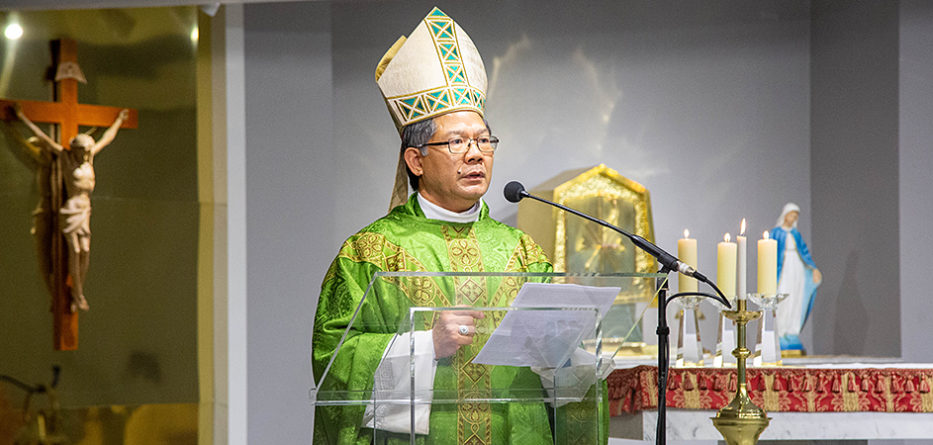Most Reverend Vincent Long Van Nguyen OFM Conv DD STL, Bishop of Parramatta
Homily from the Twenty-Third Sunday in Ordinary Time Year C.
Readings: Wisdom 9:13-18; Psalm 89(90):3-6, 12-14, 17; Philemon 9-10, 12-17; Luke 14:25-33
4 September 2022
A completely subversive and contrasting model of being in the world
Dear sisters and brothers,
We live in uncertain and challenging times. As a result, the temptation to find refuge in the certitude of the past can be appealing, even if it is illusive. Pope Francis often speaks against the illusion of the politics of populism and the retreat from the hard road of solidarity and shared commitment to the common good. In the life of the Church, too, the same temptation to seek the proverbial good old days is as real for us today as it was for God’s people wandering in the desert. Yet, the God that Jesus revealed does not let us get away with our propensity towards the comfortable status quo. He challenges us to an authentic and costly discipleship – one that involves us laying down our lives for the sake of God’s kingdom and for God’s poor, forsaken and oppressed.
Scripture today teaches us that Christian life is not about preserving one’s life and privileges or asserting one’s rights at the expense of others. Rather, it is about giving oneself to a greater cause and focusing on the vision of God’s kingdom. We followers of Christ are to live life to the full by surrendering to the process of defeat, suffering and dying. This is the great paradox that Jesus taught and lived: life is lived fully not by surrendering it to self-survival instincts or the dominating powers. Life is fully lived when it can make a difference to others, that it can transform society and make it into a mirror of God’s kingdom.
The Book of Wisdom sounds a warning to those who are busy acquiring the knowledge of a worldly nature. It argues that God’s ways are far beyond the limited human knowledge. “The reasonings of mortals are unsure and our intentions unstable”. It then invites us to to adopt God’s ways which are above human ways. In the greater scheme of things, God’s ways constitute an alternative consciousness that orients us away from the culture of entitlement and the survival of the fittest. This alternative consciousness is at the heart of the teaching and example of Jesus, the divine wisdom personified.
Indeed, when we hear the words of the Gospel, it becomes abundantly clear that a radically different way of seeing, living and relating is offered. We are dealing a completely subversive and contrasting model of being in the world that is required of the disciples of Jesus. Nothing short of a counter-cultural mindset is needed to be part of God’s household.
“If anyone comes to me without hating his father and mother, wife and children, brothers and sisters, and even his own life, he cannot be my disciple.” On the face of it, this teaching seems incomprehensible and indeed unconventional. Yet, like his use of metaphors like “father against son”, “mother against daughter”, these are part of the language of poetry and hyperbole, designed to provoke and shock the audience out of complacency.
The litmus test of Christian discipleship is complete fidelity to the cross in the footsteps of the suffering Messiah. This fidelity would cut through biological bloodlines and traditional structures. The early Christians knew only too well the cost of belonging to God’s household. They experienced not only social disadvantage but at times even rejection from their own family. Christian discipleship ultimately takes us to Jerusalem with the Suffering Servant of God. Nothing short of a total consuming passion will see us through.
Jesus challenges us, as he challenged the disciples, to move from the cultural model of power, dominion and self-preservation to the new Kingdom model of service, love and self-sacrifice. Paul echoes the teaching of Jesus by exhorting Philemon to welcome Onesimus not as a slave but as a dear brother, indeed as a blood brother as well as a brother in the Lord. In other words, just as Christian identity cuts through biological bloodlines and traditional structures, Onesimus’ membership in God’s household affords him new freedom, dignity and status beyond the social pyramid model of the Greco-Roman world. This understanding of the Church as a counter-witness to relationships based on privileges, entitlements and class distinctions is nothing short of a revolution. We are all brothers and sisters and share a common identity as members of God’s family, paradoxically serving one another as “a slave of all”.
Dear friends,
In Jesus who surrounds himself with the outcast, we see a God of solidarity and vulnerability. In Jesus, we meet a God who disturbs our comfort and who pushes us out to the periphery to be with the least of his brothers and sisters. Let us live the call of the Christian discipleship in an era where there is much mistrust, scepticism, partisanship and polarisation. May the God who accompanies His people enable us to walk the hard, long and often winding road of critical discernment, truth seeking, neighbourly service and fidelity to the cross. May we learn the art of living in God’s presence: our identity grounded, commitment deepened and mission nurtured for greater service of the kingdom.








